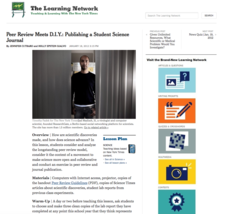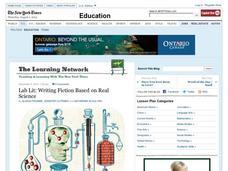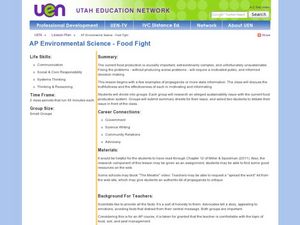Curated OER
Peer Review Meets D.I.Y.: Publishing a Student Science Journal
Peer review of science laboratory reports? You bet! First, learners work in pairs to review a scientific article. Then they trade lab reports for peer review. The end result is the publication of a classroom scientific journal!
National Wildlife Federation
Citizen Science to the Rescue!
You don't have to be a scientist or even out of high school to contribute to scientific research. In the 12th lesson in the series of 21, scholars use this opportunity to add to the growing body of scientific knowledge and consider the...
Mascil Project
Molecular Gastronomy - Science in the Kitchen
Some say cooking is an art—and a science! Scholars scope out the savory subject of molecular gastronomy with a series of related activities. The teacher's guide contains printable worksheets and helpful tips for implementing the activity.
Cornell University
Forensic Science: Case of the Missing Diamond Maker
Someone stole a diamond-making machine. Who done it? Scholars use forensic science at six different stations to determine the culprit. They analyze fingerprints, use their senses, and complete chemistry experiments to determine the...
National Science Teacher Association
Middle School Sampler: Science
Focus on inquiry-based learning in your science class with a series of activities designed for middle schoolers. A helpful packet samples four different texts, which include activities about predator-prey relationships, Earth's axis and...
Curated OER
Playing With Science
Young scientists investigate the scientific concepts and principles that help make common toys such as hula hoops, yo-yos, slinkies, and silly putty work. As a class, they read "Backyard Rocket Science, Served Wet" to get a look behind...
The New York Times
Writing Fiction Based on Real Science - NYTimes.com
Refuse to alienate your scientific-minded young scholars during your creative writing unit. Learners explore how literary writing can reflect observable fact, and be based in actual science. The links include examples of fiction and...
Curated OER
Exploring Living Science Careers
Use a variety of group activities to explore living science careers. Living science careers include everything from a food scientist or farmer to a veterinarian or agricultural economist. Kids will discuss 31 different careers in this...
Berkshire Museum
Where’s the Water?: Acting Out Science Cycles
Young scientists transform themselves into rivers, oceans, clouds, and drops of water in order to explore the water cycle. After assigning and explaining to learners their different roles in the activity, the teacher reads aloud a...
National Endowment for the Humanities
Kennewick Man: Science and Sacred Rights
"Have respect for the dead!" Scholars investigate how science and religion often clash. As they look into the laws of science and the laws of religion, the legal ramifications at the federal level of both play into an argument they...
Polar Trec
Science in Antarctica
PolarTREC brings polar researchers and educators together to benefit both science and education. Pupils select one research project in Antarctica to explore and present to their peers. Scholars polish research and presentation skills as...
Curated OER
Shadows & Light, Science & Puppetry
Lights, shadows, action, and inquiry await your artistic scientists. They explore the way light travels, absorbs, reflects, and transmits through shadow play. They create folktale-inspired shadow puppets, explore the science of light,...
Ventura County Air Pollution Control District
Effects of Global Warming
Your learners have probably heard of climate change, but do they really understand what it is? Study the history, details, and future implications of global warming and the greenhouse effect with a set of activities designed for an...
National Association of Biology Teachers
Using the Discovery of the Structure of DNA to Illustrate Cultural Aspects of Science
Times have changed—and so have science practices. An introductory lesson describing the components of DNA begins with a discussion of the discovery of DNA and its perception in different cultures and genders. Scholars then learn about...
Curated OER
AP Environmental Science-Food Fight
The content in this instructional activity is of a controversial nature. Please review to make sure it is suitable for your class. A video, The Meatrix is shown to the class, and then they discuss the emotionally-charged language that it...
media.yurisnight.net
Science Lesson Plan: Our Solar System: I Wonder?
Ever wonder why Pluto isn't considered a planet? Or how large the Earth is compared to the other inner planets? Explore the universe with a series of projects that simulate different aspects of our solar system. The activities require...
National Nanotechnology Infrastructure Network
Is Measuring an Art or a Science?
Not only do future engineers learn the difference between accuracy and precision, they also get some hands-on experience using different measuring tools.
Scholastic
Lesson Two: The Earth, Introductory Activities
Determine what young pupils already know about earth science with a brainstorming activity. After class members work together to complete a KWL chart about the Earth, they craft an acrostic poem to demonstrate their understanding.
EngageNY
Science Talk: How do Bullfrogs Survive
Following the reading of the book Bullfrog at Magnolia Circle, the ninth instructional activity in this unit involves emerging experts in a science talk about how bullfrogs survive. Looking back through the text, young scholars prepare...
Baylor College
Fuel for Living Things
During a three-part lesson, learners make a cabbage juice pH indicator and use it to analyze the waste products of yeast after feeding them with sugar. The intent is to demonstrate how living organisms produce carbon dioxide, which is...
Baylor College
Measuring and Protecting Skin
Several subjects are addressed within the context of a science lesson about the sun's ultraviolet rays. Elementary earth scientists consider protection of the skin with sunscreens (health), estimating and measuring surface area or an...
California Academy of Science
Human Evolution
As the great and hilarious Tim Minchin once said, "Science is simply the word we use to describe a method of organizing our curiosity." Science is more than just a guess; it is based on questions, observations, and evidence. High...
NOAA
A Moving Crust
Young scientists piece together the geological puzzle that is the earth in the third and final lesson of this earth science series. With the help of numerous multimedia resources and a series of engaging hands-on activities, students...
NOAA
What's the Big Deal?
Who knew that a possible answer to Earth's energy resource problems was lurking deep beneath the ocean's surface? Part four of a six-part series introduces Earth Science pupils to methane hydrate, a waste product of methanogens. After...
Other popular searches
- Earth Science
- Physical Science
- Life Science
- Science Project
- Science Space
- Environment Science
- History of Science
- Environmental Science
- Pe Science
- Family and Consumer Science
- Consumer Science
- Social Science

























